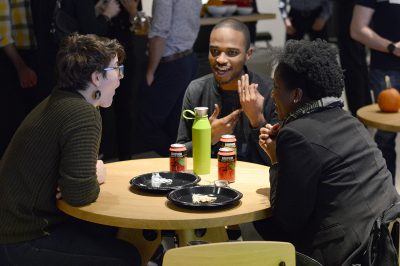
Being recognized, heard and supported are desires of any employee. However, in an industry such as technology, achieving these desires can be particularly difficult for the LGBT community. Often, major roles tend to fit a cisgender-straight-white-male model, which can overpower other faces in the office.
“Out in Tech” is a New York City-based nonprofit that seeks to relieve some of the alienation queer folks can feel in the tech world and in turn unite the community, according to Alexis Schuette, one of four organizers for Boston’s Out in Tech initiative.
On Thursday, the organization officially launched its Boston branch with a kick-off mixer downtown.
As over 50 people gathered in a modern upper-story event space in downtown Boston, excitement seemed to vibrate throughout the room. Attendees sipped complimentary beverages while adding sticky notes to idea boards set up by the organizers.
“The vision of Out in Tech is to provide a place where people in the queer community can be visible and encourage each other,” Schuette said, “while providing a space where we not only can gather and discuss issues … but also give back to the community.”
Out in Tech seems to be building a community around that uniqueness, with chapters already up and running in New York City, Los Angeles and San Francisco, according to the Out in Tech website.
“I think being queer within the tech community is a very unique existence,” said Cole Dachenhaus, another organizer.
During the event, Schuette and Dachenhaus were joined by fellow organizers Lakshmi Kannan and Michael Powers.
“Boston is one of those cities that is a forgotten tech city, unless you’re living here,” Schuette said.
She noted the focus on the California and New York tech scenes, but recognized Boston as a leader in less consumer-facing technology, focusing more on biomedical, education and business tech.
Schuette recognized New England for already being a supportive community for the queer population, as well.
“There’s huge tech events that happen here, so why not something that combines both of those things?” she said.
Attendees expressed appreciation for the new LGBT tech space.
Jingo Mante, 25, a senior associate at PwC, recently moved to Boston from Los Angeles. She said this was her first Out in Tech event, and it won’t be her last.
“Being a woman and being gay means I am kind of a double minority in tech, so finding a community like this is so important,” Mante said.
She said she was excited to meet new people that are part of both the LGBT and tech communities.
Nathanael Van Vorst, 35, from Denver, agreed with this sentiment. As a staff engineer at Delphix and a professor at the Wentworth Institute of Technology, he said he loved the opportunity to make connections with other companies since the “tech scene in Boston is so small.”
Van Vorst also expressed hope that Out in Tech would help the LGBT community find accepting companies for employment opportunities.
Feedback is exactly what the Out in Tech Boston team was looking for during the mixer, according to Dachenhaus.
“We want to know what the people here really want to be doing,” Dachenhaus said. “It’s learning about what this very different community is … We aren’t able to look at our previous chapters and say Boston is going to be just like that.”
Out in Tech is more than mixers. Other than networking events, the organization offers career development resources and web services. They also have an avid youth outreach arm focused on knowledge, exposure and support, according to the Out in Tech website.
“We want to show folks that there are queer people actually working these jobs,” Schuette said, sounding hopeful. “A lot of us wouldn’t be here without someone pulling us up with them or sending the elevator down for us.”



























































































































